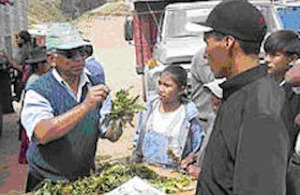DFID Research: Going Public to save harvests and time
Agronomists take their message out to farmers.

Daniel Vasques discusses peach problems with truck passengers in Bolivia. Picture: Eric Boa/CABI
At a busy passenger truck stop in Bolivia, men, women and children crowd around a small table covered in leaves. Several people ask questions, while others just listen. The man behind the table talks animatedly. Unlike the food vendors standing nearby, he has nothing to sell, but plenty to talk about.
Daniel Vasques is an agronomist from Chuquisaca who has worked with farmers for over 20 years. He is a highly experienced tecnico (technical person) and he knows the difficulties in reaching many farmers in remote areas. The simple solution is to have more tecnicos, but there will never be enough to reach all the far-flung farming communities of Bolivia. So, to make better use of his knowledge, Mr Vasques, along with another experienced tecnico, Juan Almanza, use ‘Going Public’ to take popular, technical topics to places where rural people congregate. The first two times they ‘went public’ with potato and peach pests. The farmers were delighted to find out what was wrong with their crops, and what to do about it, especially because ‘Going Public’ conveys a message in just a few minutes.
At a big fair held at Tiraque, in 2 hours, Juan Almanza showed over 60 farmers the difference between nematodes on potatoes and nitrogen-fixing nodules on beans. Mr Almanza used a microscope in the back of a pick-up to show the nematodes. He also used a simple test with a piece of newspaper and a glass of water to see if soil had nematode cysts, which survive in the soil, and attack potatoes planted there later. One farmer liked the test so much he repeated it with soil collected from bags of potatoes being sold in the market.
Truck Stop Information Point
After the success of Juan Almanza at the fair in Tiraque, Mr Vasques decided to use the passenger truck stop in Sucre, where people wait for trucks to take them back to the remote regions of North Potosi. Vasques borrowed a table, laid out peach leaves clipped that morning, and immediately drew a crowd. He explained the causes for different peach disease symptoms, which farmers tend to confuse. He told how ants care for aphids by herding, protecting and ‘milking’ them as if they were cattle. He explained that if the farmers keep the ants from tending aphids, the natural enemies of the aphids will kill them. He used photographs and local names to describe these beneficial insects to his audience. Despite the noise of trucks pulling out, grey skies threatening rain and vendors hooting their horns, Vasques spoke with over 30 people in under 2 hours.
‘Going Public’ not only provides an opportunity to talk to farmers, but also to traders and agrochemical salesmen - who are the only source of advice to farmers in some areas. ‘Going Public’ is also a chance to find out more about farmers’ questions and concerns (Do ants eat aphids? How can I get rid of the nematodes in my field?).
One advantage of ‘Going Public’ is that people only stay to listen if they are interested. The extensionist (tecnico) must be interesting and doesn’t have the luxury of droning on to a captive audience. Extensionists who ‘Go Public’ don’t have to put on a show, but must get to the point and have practical ideas on how to save farmers’ crops.
Thanks to ‘Going Public’, several thousand farmers in Bolivia, Bangladesh, Uganda and Kenya have found ways to manage their crop diseases. ‘Going Public’ is not the only means of getting a message across: field schools, mobile plant clinics, even radio programmes and other methods are useful for certain conditions. However, if setting up a stall in a crowded place helps to reach villagers that otherwise would never meet a tecnico, then a few hours spent at the local truck stop can surely prove worthwhile.
More information
See DFID project record for CABI - Global Plant Clinic (GPC)